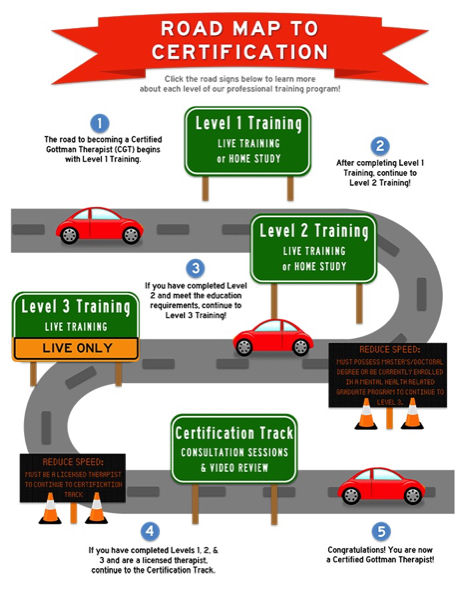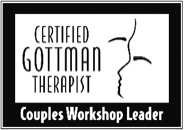Gottman Method Level 3:
Practicum Workshop and Training
Workshop Objectives and “Road Map”
to Gottman Therapist Certification
Workshop Outline and Objectives
At the end of this workshop participants will understand how to:
• Choose an intervention that is appropriate for the clients at
the moment.
• Recognize the “Four Horsemen” when one member of a
couple exhibits that behavior.
• Stop the couple’s dyadic interaction when one member
exhibits one of the “Four Horsemen”.
• Describe the “Four Horsemen” to the couple.
• Explain the antidote to the relevant horsemen clearly and
accurately.
• Coach the person with an alternative way to express him or
herself using an appropriate antidote.
• Re-direct the couple to resume communication in a dyadic
way. Continue to monitor for the “Four Horsemen” and
intervene if they reemerge.
• Identify when one of both partners are physiologically
flooded (and not just upset) and stop the interaction
between the couple.
You’ll fine-tune and master your understanding
of the Gottman Method...
• Provide a brief explanation of flooding in clear, sensitive
language.
• Intervene by guiding one or both partners through a
relaxation technique before continuing.
• Explain the “Dream Within Conflict” process and goals
clearly.
• Instruct couple on “Dreams Within Conflict” intervention.
• Assist one partner to ask the other partner questions about
the dream or deeper meaning embedded in their specific
grid-locked issue.
• Provide “The Dream Catcher Questions” handout and coach
one partner to ask the other questions from the handout to
increase understanding of their partner’s underlying dreams
or deeper meaning embedded in the specific grid-locked
issue; help the couple hold to the questions to go deeper vs.
getting into their own point of view.
• Introduce the concepts of softened start-ups and explain
why it helps (i.e. it is easier for their partner to hear and
understand their point).
• Explain research showing that the first three minutes of a
discussion predicts whether that discussion will go well and
whether their overall relationship will go well.
• Explain the importance expressing needs in positive terms
and instruct the partner to restate their point without
criticism and then direct them to resume dyadic interaction.
• Stop couple’s interaction when one or both partners are not
accepting influence.
See on film Drs. John & Julie Gottman
demonstrating assessment and interventions
in case examples pulled from their private practice.
• Explain the need for accepting influence (which may include
references to research). This includes finding a way to
understand and honor some aspect of their partner’s
position, with a focus on yielding and accepting influence
rather than on persuading.
• Stop couple and instruct in the concept of offering and
accepting repairs and why it is useful.
• Provide the “Repair Checklist” and explain its use.
• Ask appropriate Gottman “Oral History” questions and stay
on track with sensitivity to couple’s issues and building
rapport.
• Conduct “Oral History” interview with sensitivity to issues
of Co-Morbidity.
• Integrate assessment information from the “Oral History”
session, “Individual Relational Interviews” and “Assessment
Questionnaires” to summarize the couple’s strengths,
weaknesses, and primary issues.
• Interpret assessment findings accurately.
• Share Gottman research findings accurately when relevant.
• Explain each level of “The Sound Relationship House” and
then provide feedback on that level before describing the
next level.
• Formulate therapy goals that are consistent with :The Sound
Relationship House” model as appropriate for the couple.
Receive a Clinical Manual featuring
new relationship assessment questionnaires
and clinical interventions.
Gottman Road Map to Certification

* Note: For More Info on Continuing Education Credits - CE Credits - CE’s - See Registration Page
◊ Make your Gottman Training
a San Francisco Bay Area Retreat - Learn More! ◊
These Level 3 workshops are presented in a “Professional Retreat” setting just minutes north of San Francisco and the Golden Gate Bridge at the SF Theological in San Anselmo.
Lisa Lund, CRC, MFT
Master Certified Gottman Therapist
Couples Workshop Leader
(415)721-4310
“It was helpful to have experienced
‘The Art & Science of Love’ a few weeks ago -
to have the personal experience
brought an added element to the learning today!!!”
Payment plans available thru PayPal!
See Registration page for details!



